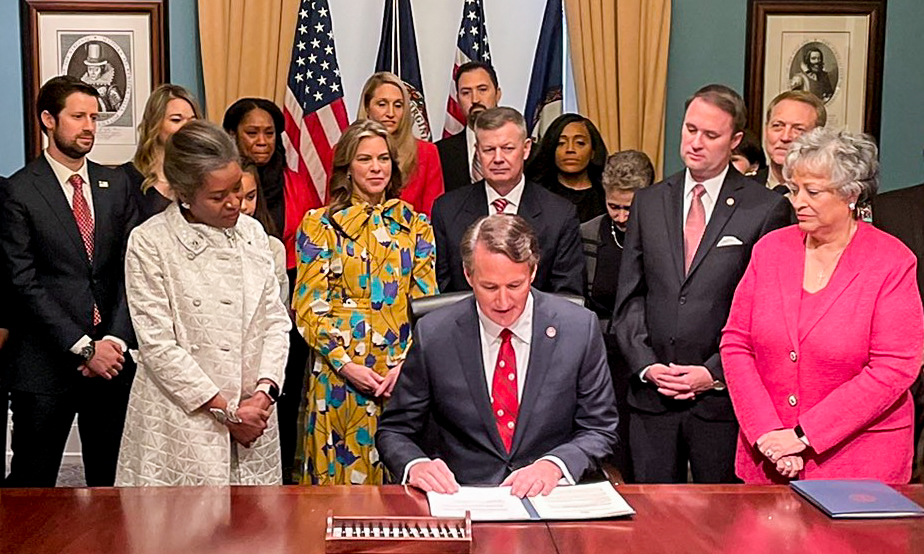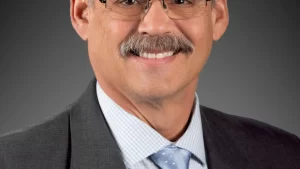After eight years, Virginia has a Republican governor again. Gov. Glenn Youngkin, a former business executive with no political experience, secured victory last November off the back of a campaign that emphasized parents’ rights, tax cuts, and law and order.
In particular, it was parents growing increasingly concerned about the transmission of critical race theory (CRT)—a quasi-Marxist analytical framework that views America as systemically racist—in schools, that provided the crucial assist in Youngkin’s two-point win in a state that just a year earlier had firmly voted for Biden by 10 points.
Within hours of taking office, Youngkin went into action to make good on some of his campaign promises by signing a slew of executive orders, such as banning CRT, making mask-wearing in schools parents’ choice, firing the parole board, and more. Virginians who voted for him were thrilled.
But the blowback has also been swift.
Less than a month into office, his executive order banning mask mandates in public schools has been challenged in three separate lawsuits. On Feb. 4, a judge at the Arlington Circuit Court issued a temporary injunction in favor of seven school boards challenging the order, allowing them to keep mask mandate before the final ruling.
In response, Youngkin’s Press Secretary Macaulay Porter said in a statement, “The governor will never stop fighting for parents’ ability to choose what is best for their children.” Attorney General Jason Miyares’ community outreach office told parents that the ruling was only the first step in the judicial process, adding that the attorney general’s office would appeal the injunction.
But the governor has met with success in another case. On Feb. 7, the Supreme Court of Virginia dismissed a lawsuit brought by Chesapeake parents seeking to overturn Youngkin’s mask-optional order.
Meanwhile, Youngkin’s first executive order banning the teaching of “inherently divisive concepts, including critical race theory,” which included an email address for parents to report any issues they had with schools, has drawn an outcry from Democrats and teachers’ organizations.
Del. Lamont Bagby (D-Henrico), chair of the Virginia Legislative Black Caucus, accused Youngkin of declaring a “war on Black history.” And Del. Don Scott (D-Portsmouth) said on Jan. 26 that the ban on CRT suggested that Youngkin was not “a man of faith, not a Christian.”
Along with several other educators’ organizations, the Virginia Education Association issued a statement on Feb. 3, calling on Youngkin to “immediately shut down the tip line and rescind Executive Order #1.”
In a State House floor speech on Jan. 28, Minority Leader Eileen Filler-Corn (D-Fairfax) accused Youngkin of “trying to implement a far-right agenda.”
But such backlash is not surprising, according to Kristin Davison, vice president at Axiom Strategies, the firm that advised Youngkin during his campaign and continues to do so after he took office.
“Partisan politicians are going to distort reality to fit their agenda,” Davison told The Epoch Times. “Anyone that tries to say he’s more conservative or not than they thought he would be hasn’t been paying attention for the last year. He was very deliberate during the campaign, saying what he was going to do on day one.”
As for Youngkin’s voters who were nervous before the inauguration about whether the governor would deliver his campaign promises, Davison said, “It’s because they were used to politicians for decades campaigning on one thing and doing another.”
“So, what they are getting with Governor Youngkin is a non-politician who campaigned on exactly what he’s going to do. And it’s exactly what he did on his first day in office,” she added.
State Sen. Chap Petersen, a moderate Democrat who was elected to the Virginia General Assembly in 2002 and later became a member of the state Senate in 2008, said House Minority Leader Filler-Corn’s “far-right agenda” statement sounded like “hyperbole.”
“Both sides [Democrats and Republicans] have their version of cultural wars. Both sides respond to their partisans and try to play to people’s expectations,” Peterson told The Epoch Times.
“I don’t see him [Youngkin] doing anything he didn’t campaign on, and he got the majority of the vote. You may say that’s a ‘far-right agenda,’ but they got the most votes.”
Battles in the Legislature
Youngkin also faces resistance in the Democrat-controlled Senate.
Some key items on his legislative agenda (pdf) have already been blocked in the chamber: reducing regulations, repealing a 2020 law on collective bargaining, establishing publicly funded charter school divisions, and ending the teaching of “inherently divisive concepts.”
A bill to rename the state’s director of Diversity, Equity, and Inclusion to the “director of Diversity, Opportunity, and Inclusion” was also killed on Jan. 26. Former Gov. Ralph Northam had created the cabinet-level position in 2019.
Youngkin’s legislative agenda has made some gains in the Republican-controlled state House. A bill prohibiting discrimination or preferential treatment of students based on race, sex, color in school, and during admission passed on Feb. 2. A day prior, the House also passed legislation restoring mandatory reporting of sexual battery in schools to law enforcement. However, these bills will likely face challenges in the Senate.
“I’m disappointed at the partisan politics that I see being played in the Senate,” Youngkin told WTKR-TV on Feb. 4, “Virginians are tired of this. This is why I won—to actually get things done.”
Former Virginia Sen. Richard Black, a Republican who retired in 2020 after serving 16 years in the state House and Senate, said that the “decent Democrats” he knew 20 years ago “who were truly thoughtful about what they did were all purged from the party.”
According to Black, it is rare to find moderate Democrats these days, as the current Democratic cohort in the state’s legislature is “extremely left-leaning” and “more closely attuned to a Marxist philosophy than to a capitalist philosophy.”
“It’s true they are able to block a great deal of Governor Youngkin’s agenda, but I think that in the end, it’s not going to benefit them,” said Black, adding that blocking Youngkin’s initiatives is not going to increase Democrats’ popularity. In addition, he predicted that Youngkin’s popularity would last.
Sen. Louise Lucas (D) said in a tweet on Jan. 18, “This new Governor wants to be like Florida, but Florida doesn’t have a Democratic majority Senate brick wall to go through.”
But Sen. Petersen holds a different view, “I’d like to think we’re all issue-based. I don’t think there’s anybody in my caucus—there are 21 members—that just wants to oppose him [Youngkin].”
“There’s going to be bills that we passed on minimum wage, voting rights, and criminal justice reform where we’re going to hold the line on what we accomplished, and his [Youngkin’s] initiative is going to be defeated,” he added.
Over the past two years, with a Democrat-controlled executive and legislature, then-Gov. Northam signed into law a series of liberal measures, including increased gun control, lifting abortion restrictions, and relaxing voter requirements.
Opportunities Amid Challenges
Former Virginia governor George Allen, a Republican who’s been credited by many for leading the state to an economic revival during this term from 1994 to 1998, sees similarities between his administration and Youngkin’s.
After 12 years of Democratic government, Allen took office with the House under Democratic control throughout his term, and a Democrat-majority Senate for the first half and a split Senate in the second half. Youngkin, meanwhile, is contending with a 21-19 Democratic majority in the Senate. In the House, Republicans gained a 52-48 majority in 2022.
The former governor has been advising Youngkin informally since meeting him at a Virginia Beach restaurant last fall. He was proud that Youngkin had adopted his slogan: “Virginia is open for business.”
“I think he is doing an outstanding job,” Allen told The Epoch Times. “I’m thrilled. I think he’s liberating Virginia.”
But the task won’t be easy, the former governor acknowledged. He said Youngkin would need to build a strong team of not just cabinet secretaries but deputies, agency heads, directors. And this team needs to make sure the state employees “follow the law and be properly motivated.”
According to Allen, both Youngkin and he are competitive people, having both played sports at the college level: Youngkin played basketball at Rice University, and Allen football and rugby at the University of Virginia. From this, Youngkin understands the importance of teamwork and that no one can get things done alone, Allen said.
He said he could tell that Youngkin didn’t want to be a governor as a “been-there-done-that” mark in life; Youngkin wants to get things done.
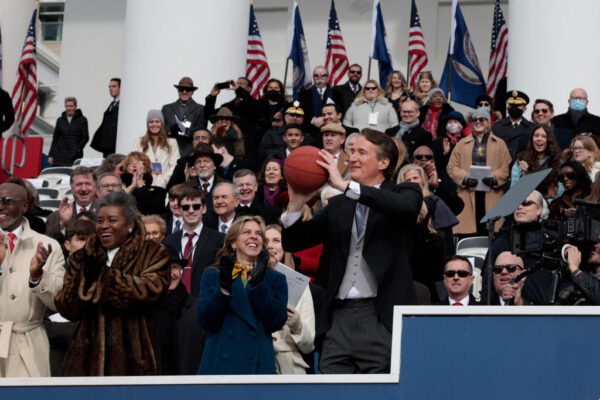
During his inauguration speech, Youngkin vowed to strengthen and renew the “spirit of Virginia” associated with the history of the state as the home of American democracy. He emphasized the “deep and abiding respect for individual freedom” as the “common path forward” for Virginians. “The spirit of Virginia is alive and well!” he repeated at other events during the inauguration weekend.
Comparisons have already been made between Allen and Youngkin. One columnist and long-time critic of Allen recently wrote: “Is Youngkin’s reign a George Allen sequel?”
Allen left office in January 1998, with a legacy that includes overhauls of Virginia’s criminal justice system, welfare reform, and the institution of standards of learning in public schools. He eliminated parole for felony criminals and established “truth-in-sentencing” measures to ensure inmates serve at least 85 percent of their sentences.
Between 1993 and 1997, the state added 392,000 jobs. The unemployment rate went down from 5.1 percent to 3.5 percent, and the state’s average monthly welfare expenses decreased from $19 million to $11 million.
According to Allen, education, law and order, and job creation are among a governor’s top responsibilities. And these items also seem to be on top of Youngkin’s agenda.
During his inauguration speech, Youngkin promised to get Virginia’s children “career and college ready,” create 400,000 new jobs and 10,000 new startups in four years, and “fully fund” and “return respect to” law enforcement.
The former governor gave a set of metrics for voters to evaluate Youngkin’s job performance: student test scores for education, crime and recidivism rates for law and order, and the number of net new job creations for the economy. Out of those, education reforms would take some patience, he noted.
According to the Bureau of Economic Analysis, Virginia’s gross state product (GSP) growth rate—the indicator of a state’s overall economic health—treaded below the national level: 0.7 percent compared with the nation’s 1.6 percent compound annual growth rate (CAGR) between 2010 and 2020.
The state’s personal income—an overall indicator of state residents’ economic wellbeing—also lagged behind the nation: a CAGR of 3.8 percent compared with America’s 4.5 percent between 2010 and 2020.
As a result, Virginia dropped from a rank of 9th in 2010 on both GSP and personal income among all states to 12th on personal income, and 13th on GSP in 2020.
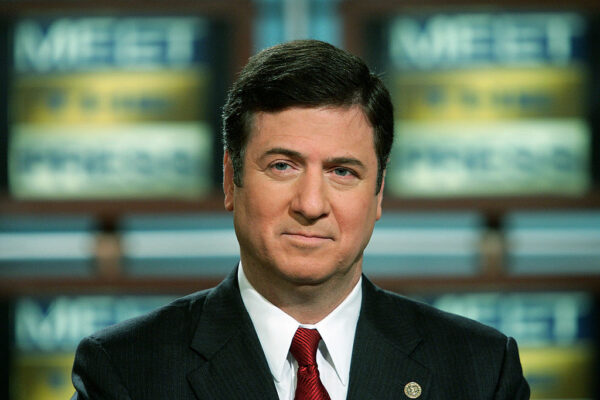
As the governor of Virginia, “you need to be going at a rapid rate of speed right from day one,” said Allen, referring to the unique Virginia rule that a governor cannot serve terms back-to-back.
Allen spoke highly of Youngkin’s integrity: “I know his commitment and his integrity to keep promises. I’m very confident that Gov. Youngkin is going to continue with the energy and dedication [on day one] to achieve these promises to the owners of the government, the people of Virginia.”
“Instead of Virginia continuing to descend and go over the cliff, Virginia is going to start ascending again and becoming more competitive and safer,” he added.
Allen entered office in 1994 with both state houses under Democrat control, 52-47 in the House and 22-18 in the Senate. With his active campaigning on kitchen-table issues and traditional values, he helped Republicans gain a 20-20 split in the Senate in 1995, forcing a power-sharing agreement. In 1997, the Democrat majority in the House shrank to 50-49.
Now, Youngkin has an opportunity to influence a similar result. Republicans could take over the upper house in November 2023 at the next Virginia Senate elections.
“I think the national environment is changing so rapidly and so decisively against what the Democratic Party has become,” said Black. “In Virginia, they are going to be faced with headwinds that are going to be like a hurricane.”
A New Style
Del. Wren Williams, a first-term Republican delegate, commended Youngkin for “bringing a good common sense of business principles into executive government.”
“I have seen a smile on the faces of older legislators because they have now finally gotten a governor who knows how to operate efficiently, who knows how to get the job done,” Williams told The Epoch Times.
He is one of the 12 Republican first-term delegates sworn in earlier this year. The state House also welcomed eight Democratic first-term members.
Republican legislators are not without doubts, he said. “Their doubts are, how are we going to be able to get all of these things done. Gov. Youngkin is moving at lightning speed. We are trying to keep with him.”
Criticism of Youngkin by legislators, Williams said, was “based on philosophy and points of view, not how he is carrying out his work.”
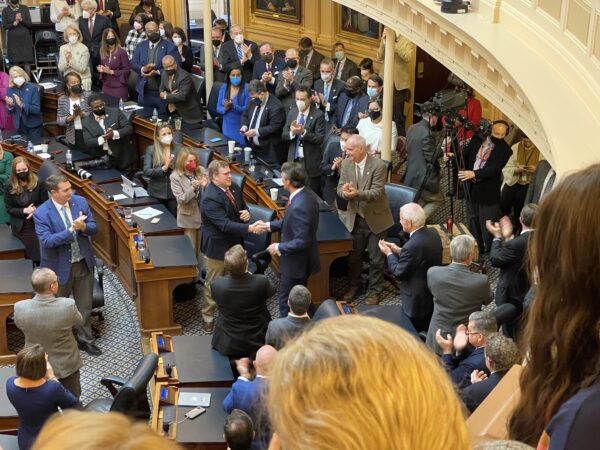
In terms of Youngkin’s business style, Democratic Sen. Petersen said, “I’m still trying to get used to it. We’re getting used to it.” He noted that Youngkin’s lack of political background might be a disadvantage “in that he’s still learning the system.”
However, he added: “It can be an advantage because he brings people in from a business background; they may not have the limitations that some of us do. We’ve been doing this for 20 years. And sometimes, when you do it for 20 years, you think that’s the only way to do it, and it’s not.”
The Epoch Times reached out to Youngkin’s office for comment, but did not receive a response by press time.
Impact on Midterms
Analysts consider the Virginia gubernatorial race a “bellwether” election for the 2022 midterms. Vice President Kamala Harris seemed to hold the same opinion. When campaigning for Youngkin’s opponent, former Gov. Terry McAuliffe, in late October, she said, “What happens in Virginia will, in large part, determine what happens in 2022, 2024, and on.”
The Republican base was jubilant over Youngkin’s win. Allen recalled a meeting with conservative state legislators around the country a few weeks after the Republican’s victory. Everyone was happy and wanted to know what happened in Virginia.
Davison of Axiom Strategies shares a similar observation. “The Governor was able to spark a national movement with his victory in November. What you saw in Virginia is now having a ripple effect across the country,” she said.
According to her, Youngkin campaigned on kitchen-table issues applicable throughout the nation. Democrats, in contrast, used ineffective messages—rotating between Trump, abortion, and climate change—without offering solutions or a new path forward for everyday families.
“I think Democrats both in Virginia and across the country are terrified because they don’t have an alternative that Virginians or Americans want. So they are out in the wilderness a little bit,” Davison said.
Petersen, however, doesn’t think Youngkin will have much impact on the midterms because most people who supported him will vote Republican anyway. Instead, he believes that the midterms are going to largely turn on the president’s popularity. “I think it’s more of a question of, how is Biden viewed in Virginia?” He added that President Joe Biden’s performance in controlling COVID would be key.
The state senator also acknowledged that “inflation is an issue,” adding that if inflation remains high in the fall later this year, “That’s a problem for Democrats.”
Davison agrees, saying that inflation will be a key issue going into the midterms. She added: “Democrat voters are depressed. We saw that in Virginia, and we’re seeing that nationwide right now. They elected someone who can’t lead, who is making mistake after mistake, just to take Afghanistan, take inflation.”
Black disagreed with Petersen on Youngkin’s impacts on midterms. He said that Youngkin projected “an image of hope,” an image that’s “very powerful” given the current political climate.
“The forces at work are not normal forces in American politics today. A level of anger is being done to our country that is kind of unique, and it’s not a flash in the pan type,” he said.
According to Black, Youngkin might not have national authority, but he would have the influence.
“He has the bully pulpit. He doesn’t have to say, ‘I passed this, I passed that,’ which would be nice. But he can say, ‘I stopped the downward slide. And I have returned responsibility. I’ve given voice to the parents who were so distraught about the way their children were being discriminated against.’”
Del. Williams is more optimistic, “Here in Virginia, there is a new feeling.
“It feels like a new day and feels like Virginia has gotten rid of her toxic boyfriend and is out with her friends and our family enjoying the sunny weather. We are moving forward on a more successful path to restore our great Commonwealth to a better place.”

